人教版(2019)必修 第一册Unit 2 Travelling around Discovering useful structures课件(共29张PPT)
文档属性
| 名称 | 人教版(2019)必修 第一册Unit 2 Travelling around Discovering useful structures课件(共29张PPT) |

|
|
| 格式 | pptx | ||
| 文件大小 | 1.3MB | ||
| 资源类型 | 教案 | ||
| 版本资源 | 人教版(2019) | ||
| 科目 | 英语 | ||
| 更新时间 | 2024-10-09 16:02:56 | ||
图片预览

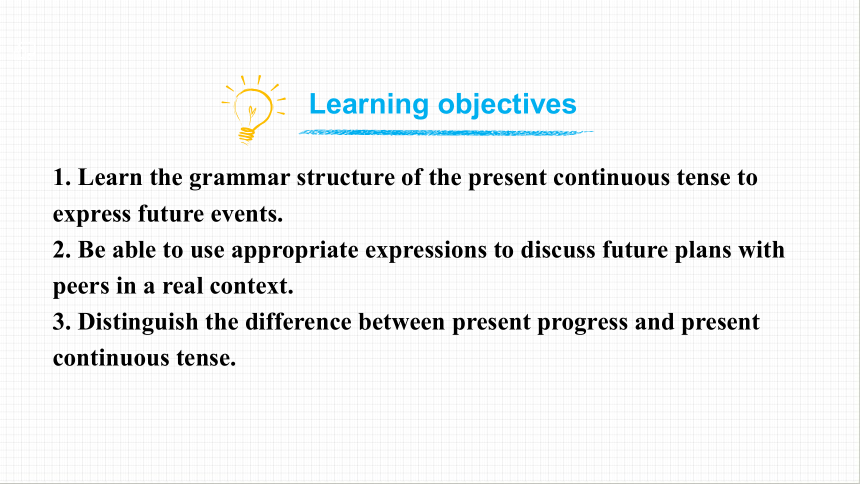
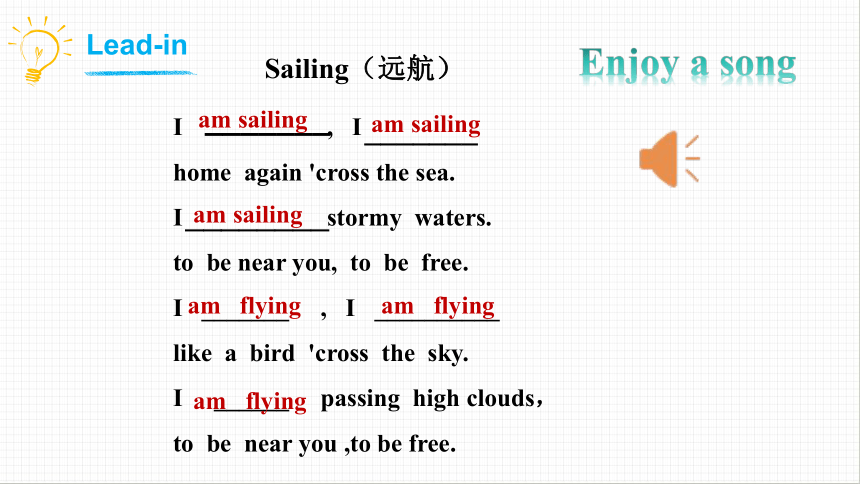
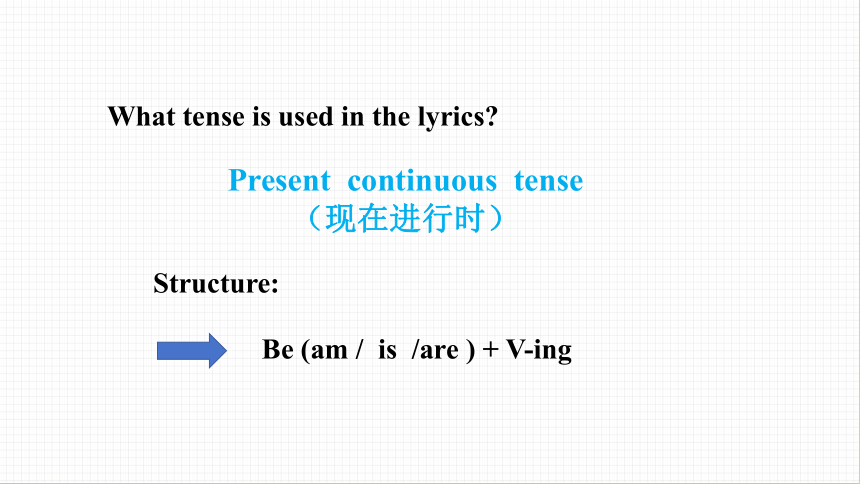
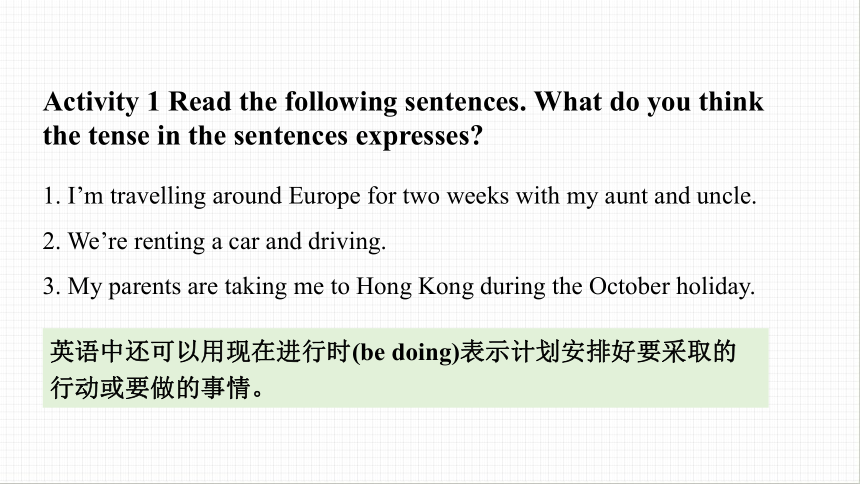
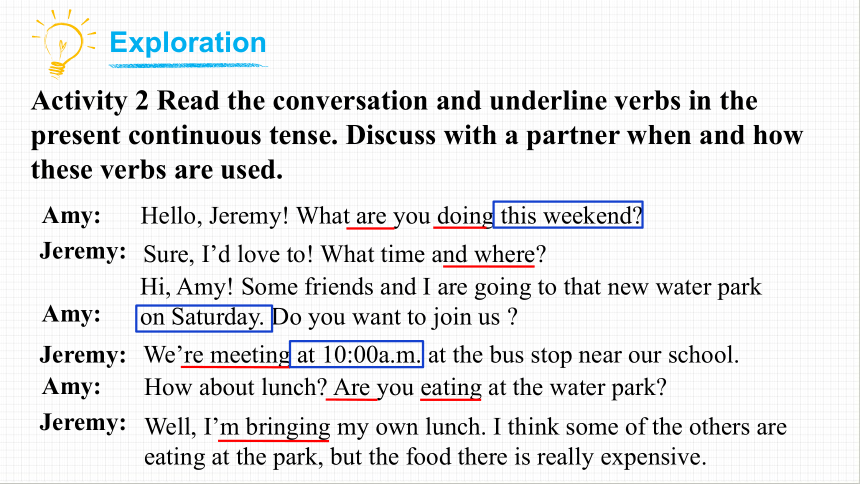
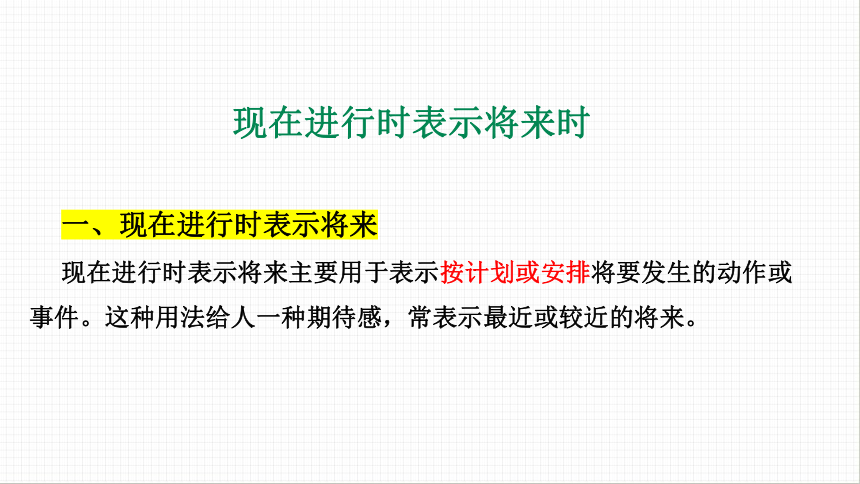
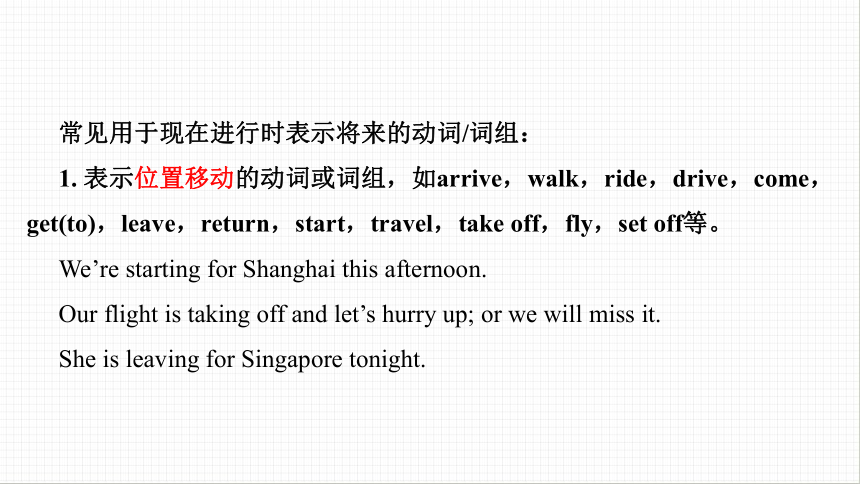
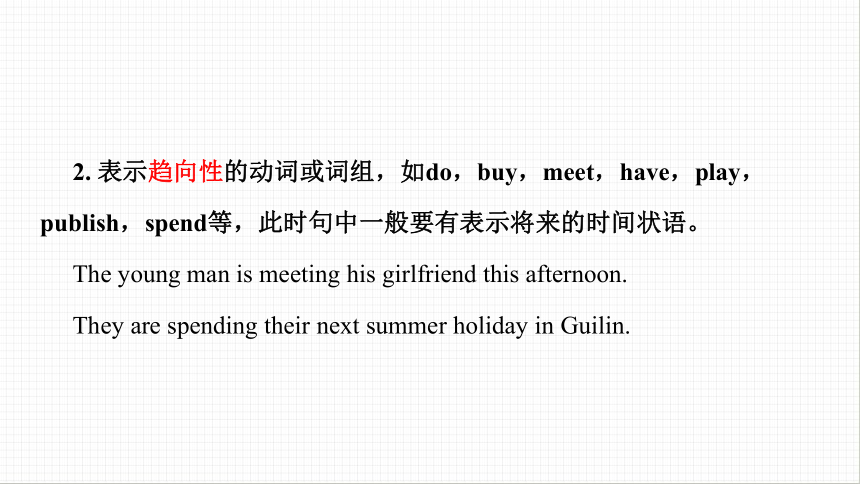
文档简介
(共29张PPT)
Unit 2 Travelling around
Discovering useful structure
Talk about your future plans
1. Learn the grammar structure of the present continuous tense to express future events.
2. Be able to use appropriate expressions to discuss future plans with peers in a real context.
3. Distinguish the difference between present progress and present continuous tense.
Learning objectives
Sailing(远航)
I , I
home again 'cross the sea.
I stormy waters.
to be near you, to be free.
I _______ , I __________
like a bird 'cross the sky.
I ______ passing high clouds,
to be near you ,to be free.
Enjoy a song
_______
_______
________
am sailing
am sailing
am sailing
am flying
am flying
am flying
Lead-in
Present continuous tense
(现在进行时)
Be (am / is /are ) + V-ing
Structure:
What tense is used in the lyrics
Activity 1 Read the following sentences. What do you think the tense in the sentences expresses
1. I’m travelling around Europe for two weeks with my aunt and uncle.
2. We’re renting a car and driving.
3. My parents are taking me to Hong Kong during the October holiday.
英语中还可以用现在进行时(be doing)表示计划安排好要采取的行动或要做的事情。
Activity 2 Read the conversation and underline verbs in the present continuous tense. Discuss with a partner when and how these verbs are used.
Amy:
Jeremy:
Hi, Amy! Some friends and I are going to that new water park on Saturday. Do you want to join us
Amy:
Jeremy:
Jeremy:
Hello, Jeremy! What are you doing this weekend
Sure, I’d love to! What time and where
We’re meeting at 10:00a.m. at the bus stop near our school.
How about lunch Are you eating at the water park
Well, I’m bringing my own lunch. I think some of the others are eating at the park, but the food there is really expensive.
Amy:
Exploration
现在进行时表示将来时
一、现在进行时表示将来
现在进行时表示将来主要用于表示按计划或安排将要发生的动作或事件。这种用法给人一种期待感,常表示最近或较近的将来。
常见用于现在进行时表示将来的动词/词组:
1. 表示位置移动的动词或词组,如arrive,walk,ride,drive,come,get(to),leave,return,start,travel,take off,fly,set off等。
We’re starting for Shanghai this afternoon.
Our flight is taking off and let’s hurry up; or we will miss it.
She is leaving for Singapore tonight.
2. 表示趋向性的动词或词组,如do,buy,meet,have,play,publish,spend等,此时句中一般要有表示将来的时间状语。
The young man is meeting his girlfriend this afternoon.
They are spending their next summer holiday in Guilin.
单句写作
①She _____________ for Singapore tonight.
她今晚将动身去新加坡。
②When _________________ off for your holiday
你什么时候动身去度假?
③What _______________ next Sunday
下星期天你打算干什么?
④My mother ____________ me a bike soon.
我妈妈不久将给我买辆自行车。
is leaving
are you setting
are you doing
is buying
二、现在进行时表示将来与表示进行的区别
1.表示将来时,通常用瞬间性动词。
The guest is arriving, but who will go to meet him at the airport
2.表示进行时,通常用延续性动词。
In the classroom, the students are discussing a plan heatedly.
3. 当现在进行时和always, all the time, forever, constantly, continually等连用时可以表达说话者的不满,厌恶,责备,惊奇,赞扬等情感。
① The woman is always complaining about her salary.
② The bosses are constantly finding fault with my father.
③ Mr. Cheng is thinking of helping others all the time.
这个女人总是抱怨她的工资。
老板老是找我爸爸的茬儿。
程先生总是想着帮助别人。
注意:其中有一些动词一般不用于进行时。
1.表示事实状态的,如:have, belong, possess, owe, exist, include, contain,weigh, measure等。
2.表示心理状态的,如:know,realize,think,imagine,remember,recognize,prefer,love,hate等。
3.系动词,如:seem, appear, feel, taste等。
4.某些瞬间动词,如:accept,give,refuse,finish,decide,complete等。
表示将来意义的其他方式
1.will/shall do
will用于各种人称,而shall 仅用于第一人称。
He will write you a letter next week.
Shall we go shopping this afternoon
1. 纯粹表示将来
2. 往往是“一时兴起”
3. 疑问句可表示建议
I shall go to the seaside for a short holiday tomorrow.
2.be going to do
He’s going to have his old car repaired.
It’s going to be a fine day for surfing tomorrow.
1. 人为主语,表计划,打算
2. 物为主语,表变化迹象
3.be to do
You are to be back by six o’clock.
1. 表示安排,意向或目的
2. 表义务,应该做……,必须做……
3. 表注定会发生
The U.S. President is to visit China.
Fish is to die without water.
4.be about to do
The concert is about to begin.
1. 表正要做某事(最近的将来)
2. 不能和表将来的时间状语连用
3. be about to do…when… “正要做…….这时”
I was about to go out when it began to rain.
5.一般现在时表示将来
(1)多指按时刻表或规定要发生的动作或事件;多为表示“出发,到达”等的动词,如arrive,leave,start,go out,take off等。
The flight to Shanghai takes off at 3:00 p.m.
The new term begins on September 1st.
(2)用于条件、时间及让步状语从句中,此时主句用将来时。
It will be five years before the project is completed.
I’ll go camping if it is fine tomorrow.
1).I’ve just booked my air ticket! I’ll visit my grandparents in December.
=____________________________________________________________________________________
2)Gray might visit China next year,but he’s still not sure.
=_______________________________________________________
I’ve just booked my air ticket! I am visiting my grandparents in December.
Gray is visiting China next year,but he’s still not sure.
Activity 3 Read the sentences and check those that express future tense .Rewrite them in the present continuous tense.
3.Kate has been invited to a meeting in Iceland.She
will apply for a visa soon.
=__________________________________________________________
___________________________________________________________
4.Could you help me with this box,please I’m afraid I’m going to drop it.
=__________________________________________________________
Kate has been invited to a meeting in Iceland.She is applying for a visa soon.
Could you help me with this box,please I’m afraid I’m dropping it.
I’m sorry,no. I am having dinner with my cousins tonight.
5.A: Hey,are free for dinner tonight
B:I’m sorry,no.I’ll have dinner with my cousins tonight.
=____________________________________________________
Activity 4 Discuss weekend plans with a partner, based on the weather report below.
Example:
A: What are you doing on Saturday morning
B: Well, it’s going to be sunny in the morning and not very windy, so I’m having a picnic with my friends.
Requirements: every part of each day (morning, afternoon, evening) is filled with activity.
1.The foreign guests ____________(arrive)in Beijing tonight.
2.The man who gave a lecture last October____________ (come )to our school tomorrow.
3. He ____________(leave )Beijing for London. His wife is expecting their next reunion in Beijing.
4. We ______________(go out) in an hour. Please make sure that everything is ready.
5. Mary ____________(leave)for Shenyang by plane at3:00this afternoon.
are arriving
is coming
is leaving
are going out
is leaving
Activity 5 Fill in the blanks with the correct forms of the words in brackets.
现在进行时表将来
将来时的表达法
1. 位移动词的现在进行时表示计划或安排
2. 非位移动词表示将来时,要有时间状语
其他表将来的表达方式
1. will / shall do 表示单纯的将来
2. be going to 表示打算计划或安排好要做的事情,或根据某种迹象表明将要发生的事情
3. be to do 表示按计划中约定的或按职责义务要求必须去做的事或即将发生的动作
4. be about to do 表示即将发生的动作
5. 一般现在时表示将来、按照日程表或时刻表的安排要发生的事,或用于时间和条件、状语从句中。
6. 状语从句中的一般现在时表示将来
Summary
Ⅰ.单句语法填空
①The plane _________ (take) off at 10:10. That is: it _________ (leave) in ten minutes.
②As soon as he _________ (come) back, I will tell you.
③The students in Grade One took eight subjects this term. They _________ (take) six subjects next term.
④—You are wanted on the phone, Ann!
—OK, I ____________ (come).
takes
is leaving
comes
are taking
am coming
Consolidation
⑤Usually the new term __________ (start) on August 29th.
⑥Tom, Mr. White _____________ (leave). Will you please show him out
⑦—Did you tell Julia about the result
—Oh, no, I forgot. I ____________ (call) her now.
⑧You are __________ (hand) in your compositions after class.
⑨“The moment ____________ (come) soon,” he thought to himself, waiting
nervously.
⑩Because the shop _________ (close) down, everything is sold at half price.
starts
is leaving
will call
to hand
is coming
is closing
Ⅱ.完成句子
①He ______________________ in two hours to meet with his manager.
他两小时后将赴伦敦和经理会面。(leave)
②We _________________________________ to attend an important meeting.
下周五我们将乘飞机去上海出席一个重要的会议。(fly)
③—What are you going to do tonight
—____________________ the baseball game of TV.
——今晚你打算做什么?
——我打算看电视上的棒球赛。(watch)
is leaving for London
are flying to Shanghai next Friday
I’m going to watch
④I’m not going out tonight. I _____________ at home.
今晚我不出去,我待在家里。(stay)
⑤The weather forecast says that _____________________ tomorrow.
天气预报说明天天气暖和。(be)
⑥He ______________ tomorrow morning.
他明天早晨到。(arrive)
⑦The guest _____________ by train tonight because he has an important
thing to deal with.
因为有重要的事情要处理,客人今晚乘火车走。(leave)
am staying
it is going to be warm
is arriving
is leaving
⑧The sports meet ______________ next Saturday.
运动会下周六举行。(hold)
⑨As soon as they __________, we will tell them all about the event.
他们一到,我们就会把事件的全部情况告诉他们。(arrive)
⑩When I grow up, I __________ the army to defend our beautiful country.
我长大后要参军保卫我们美丽的国家。(join)
is to be held
arrive
am joining
Write a few sentences to describe your travel plans , using the Present Continuous Tense .
Homework
Unit 2 Travelling around
Discovering useful structure
Talk about your future plans
1. Learn the grammar structure of the present continuous tense to express future events.
2. Be able to use appropriate expressions to discuss future plans with peers in a real context.
3. Distinguish the difference between present progress and present continuous tense.
Learning objectives
Sailing(远航)
I , I
home again 'cross the sea.
I stormy waters.
to be near you, to be free.
I _______ , I __________
like a bird 'cross the sky.
I ______ passing high clouds,
to be near you ,to be free.
Enjoy a song
_______
_______
________
am sailing
am sailing
am sailing
am flying
am flying
am flying
Lead-in
Present continuous tense
(现在进行时)
Be (am / is /are ) + V-ing
Structure:
What tense is used in the lyrics
Activity 1 Read the following sentences. What do you think the tense in the sentences expresses
1. I’m travelling around Europe for two weeks with my aunt and uncle.
2. We’re renting a car and driving.
3. My parents are taking me to Hong Kong during the October holiday.
英语中还可以用现在进行时(be doing)表示计划安排好要采取的行动或要做的事情。
Activity 2 Read the conversation and underline verbs in the present continuous tense. Discuss with a partner when and how these verbs are used.
Amy:
Jeremy:
Hi, Amy! Some friends and I are going to that new water park on Saturday. Do you want to join us
Amy:
Jeremy:
Jeremy:
Hello, Jeremy! What are you doing this weekend
Sure, I’d love to! What time and where
We’re meeting at 10:00a.m. at the bus stop near our school.
How about lunch Are you eating at the water park
Well, I’m bringing my own lunch. I think some of the others are eating at the park, but the food there is really expensive.
Amy:
Exploration
现在进行时表示将来时
一、现在进行时表示将来
现在进行时表示将来主要用于表示按计划或安排将要发生的动作或事件。这种用法给人一种期待感,常表示最近或较近的将来。
常见用于现在进行时表示将来的动词/词组:
1. 表示位置移动的动词或词组,如arrive,walk,ride,drive,come,get(to),leave,return,start,travel,take off,fly,set off等。
We’re starting for Shanghai this afternoon.
Our flight is taking off and let’s hurry up; or we will miss it.
She is leaving for Singapore tonight.
2. 表示趋向性的动词或词组,如do,buy,meet,have,play,publish,spend等,此时句中一般要有表示将来的时间状语。
The young man is meeting his girlfriend this afternoon.
They are spending their next summer holiday in Guilin.
单句写作
①She _____________ for Singapore tonight.
她今晚将动身去新加坡。
②When _________________ off for your holiday
你什么时候动身去度假?
③What _______________ next Sunday
下星期天你打算干什么?
④My mother ____________ me a bike soon.
我妈妈不久将给我买辆自行车。
is leaving
are you setting
are you doing
is buying
二、现在进行时表示将来与表示进行的区别
1.表示将来时,通常用瞬间性动词。
The guest is arriving, but who will go to meet him at the airport
2.表示进行时,通常用延续性动词。
In the classroom, the students are discussing a plan heatedly.
3. 当现在进行时和always, all the time, forever, constantly, continually等连用时可以表达说话者的不满,厌恶,责备,惊奇,赞扬等情感。
① The woman is always complaining about her salary.
② The bosses are constantly finding fault with my father.
③ Mr. Cheng is thinking of helping others all the time.
这个女人总是抱怨她的工资。
老板老是找我爸爸的茬儿。
程先生总是想着帮助别人。
注意:其中有一些动词一般不用于进行时。
1.表示事实状态的,如:have, belong, possess, owe, exist, include, contain,weigh, measure等。
2.表示心理状态的,如:know,realize,think,imagine,remember,recognize,prefer,love,hate等。
3.系动词,如:seem, appear, feel, taste等。
4.某些瞬间动词,如:accept,give,refuse,finish,decide,complete等。
表示将来意义的其他方式
1.will/shall do
will用于各种人称,而shall 仅用于第一人称。
He will write you a letter next week.
Shall we go shopping this afternoon
1. 纯粹表示将来
2. 往往是“一时兴起”
3. 疑问句可表示建议
I shall go to the seaside for a short holiday tomorrow.
2.be going to do
He’s going to have his old car repaired.
It’s going to be a fine day for surfing tomorrow.
1. 人为主语,表计划,打算
2. 物为主语,表变化迹象
3.be to do
You are to be back by six o’clock.
1. 表示安排,意向或目的
2. 表义务,应该做……,必须做……
3. 表注定会发生
The U.S. President is to visit China.
Fish is to die without water.
4.be about to do
The concert is about to begin.
1. 表正要做某事(最近的将来)
2. 不能和表将来的时间状语连用
3. be about to do…when… “正要做…….这时”
I was about to go out when it began to rain.
5.一般现在时表示将来
(1)多指按时刻表或规定要发生的动作或事件;多为表示“出发,到达”等的动词,如arrive,leave,start,go out,take off等。
The flight to Shanghai takes off at 3:00 p.m.
The new term begins on September 1st.
(2)用于条件、时间及让步状语从句中,此时主句用将来时。
It will be five years before the project is completed.
I’ll go camping if it is fine tomorrow.
1).I’ve just booked my air ticket! I’ll visit my grandparents in December.
=____________________________________________________________________________________
2)Gray might visit China next year,but he’s still not sure.
=_______________________________________________________
I’ve just booked my air ticket! I am visiting my grandparents in December.
Gray is visiting China next year,but he’s still not sure.
Activity 3 Read the sentences and check those that express future tense .Rewrite them in the present continuous tense.
3.Kate has been invited to a meeting in Iceland.She
will apply for a visa soon.
=__________________________________________________________
___________________________________________________________
4.Could you help me with this box,please I’m afraid I’m going to drop it.
=__________________________________________________________
Kate has been invited to a meeting in Iceland.She is applying for a visa soon.
Could you help me with this box,please I’m afraid I’m dropping it.
I’m sorry,no. I am having dinner with my cousins tonight.
5.A: Hey,are free for dinner tonight
B:I’m sorry,no.I’ll have dinner with my cousins tonight.
=____________________________________________________
Activity 4 Discuss weekend plans with a partner, based on the weather report below.
Example:
A: What are you doing on Saturday morning
B: Well, it’s going to be sunny in the morning and not very windy, so I’m having a picnic with my friends.
Requirements: every part of each day (morning, afternoon, evening) is filled with activity.
1.The foreign guests ____________(arrive)in Beijing tonight.
2.The man who gave a lecture last October____________ (come )to our school tomorrow.
3. He ____________(leave )Beijing for London. His wife is expecting their next reunion in Beijing.
4. We ______________(go out) in an hour. Please make sure that everything is ready.
5. Mary ____________(leave)for Shenyang by plane at3:00this afternoon.
are arriving
is coming
is leaving
are going out
is leaving
Activity 5 Fill in the blanks with the correct forms of the words in brackets.
现在进行时表将来
将来时的表达法
1. 位移动词的现在进行时表示计划或安排
2. 非位移动词表示将来时,要有时间状语
其他表将来的表达方式
1. will / shall do 表示单纯的将来
2. be going to 表示打算计划或安排好要做的事情,或根据某种迹象表明将要发生的事情
3. be to do 表示按计划中约定的或按职责义务要求必须去做的事或即将发生的动作
4. be about to do 表示即将发生的动作
5. 一般现在时表示将来、按照日程表或时刻表的安排要发生的事,或用于时间和条件、状语从句中。
6. 状语从句中的一般现在时表示将来
Summary
Ⅰ.单句语法填空
①The plane _________ (take) off at 10:10. That is: it _________ (leave) in ten minutes.
②As soon as he _________ (come) back, I will tell you.
③The students in Grade One took eight subjects this term. They _________ (take) six subjects next term.
④—You are wanted on the phone, Ann!
—OK, I ____________ (come).
takes
is leaving
comes
are taking
am coming
Consolidation
⑤Usually the new term __________ (start) on August 29th.
⑥Tom, Mr. White _____________ (leave). Will you please show him out
⑦—Did you tell Julia about the result
—Oh, no, I forgot. I ____________ (call) her now.
⑧You are __________ (hand) in your compositions after class.
⑨“The moment ____________ (come) soon,” he thought to himself, waiting
nervously.
⑩Because the shop _________ (close) down, everything is sold at half price.
starts
is leaving
will call
to hand
is coming
is closing
Ⅱ.完成句子
①He ______________________ in two hours to meet with his manager.
他两小时后将赴伦敦和经理会面。(leave)
②We _________________________________ to attend an important meeting.
下周五我们将乘飞机去上海出席一个重要的会议。(fly)
③—What are you going to do tonight
—____________________ the baseball game of TV.
——今晚你打算做什么?
——我打算看电视上的棒球赛。(watch)
is leaving for London
are flying to Shanghai next Friday
I’m going to watch
④I’m not going out tonight. I _____________ at home.
今晚我不出去,我待在家里。(stay)
⑤The weather forecast says that _____________________ tomorrow.
天气预报说明天天气暖和。(be)
⑥He ______________ tomorrow morning.
他明天早晨到。(arrive)
⑦The guest _____________ by train tonight because he has an important
thing to deal with.
因为有重要的事情要处理,客人今晚乘火车走。(leave)
am staying
it is going to be warm
is arriving
is leaving
⑧The sports meet ______________ next Saturday.
运动会下周六举行。(hold)
⑨As soon as they __________, we will tell them all about the event.
他们一到,我们就会把事件的全部情况告诉他们。(arrive)
⑩When I grow up, I __________ the army to defend our beautiful country.
我长大后要参军保卫我们美丽的国家。(join)
is to be held
arrive
am joining
Write a few sentences to describe your travel plans , using the Present Continuous Tense .
Homework
